those from disadvantaged backgrounds.
and universities.
LATEST REPORT FROM EDSK
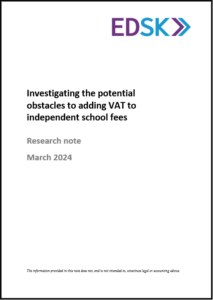
MARCH 2024
Leaving aside the debate over how much money could be raised by adding VAT onto independent school fees, this research paper outlines several reasons why attempting to add VAT to school fees could present significant legal and political challenges for a future government – more often than not due to the sheer complexity and intricacies of the legislation that underpins the operation of VAT in this country.
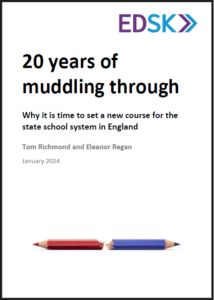
JANUARY 2024
Over 20 years after the first ‘academy’ was created in England, our fragmented state school system has become a constant source of disagreements and disruption. This report explains how to leave behind the political baggage of the past and build a coherent, collaborative and transparent school system that focuses on helping teachers and leaders devote all their energy to improving teaching and learning.
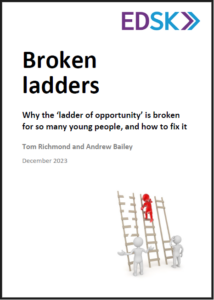
DECEMBER 2023
The academic pathway from school up to university is a well-trodden and well-understood route. In contrast, for those young people who do not attend university, the first rungs on the ‘ladder of opportunity’ are broken after two decades of neglect and underinvestment. Urgent action is now required to ensure that all young people, particularly those from less privileged backgrounds, can progress towards a good-quality job or apprenticeship.
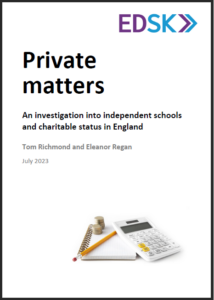
JULY 2023
Some politicians and commentators clearly feel uncomfortable with the notion of an independent (‘private’) school being classed as a charitable organisation. Even so, this report finds that a government attempting to strip independent schools of their charitable status would almost certainly end in failure under current charity legislation. The report concludes with a set of recommendations that instead aim to ensure that all charitable independent schools make a valuable and sustained contribution to society, particularly in terms of supporting the most disadvantaged families and local state schools.
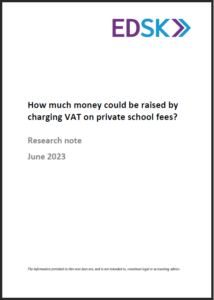
JUNE 2023
The debate over the taxation and charitable status of private schools has become increasingly high-profile, with Prime Minister Rishi Sunak recently claiming that Labour’s plan to add VAT to private school fees amounts to “attacking the hard-working aspiration of millions of people in this country”. On that basis, this research note investigates the source and credibility of the often-cited claim that the removal of the VAT exemption for private school fees would raise £1.6 billion a year.
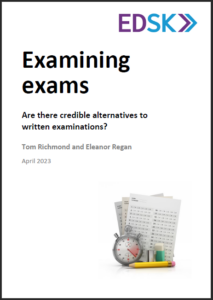
APRIL 2023
After the collapse of the exam system during the COVID-19 pandemic, debates about the future of assessment have become increasingly vocal. As A-levels and GCSEs are dominated by written exams, this report investigates whether other types of assessment such as coursework and extended projects could play a greater role in future. The launch of tools such as ChatGPT has made this issue even more pressing. The report concludes by setting out a package of reforms that aims to build on the strengths of written exams while drawing on the benefits of other assessments.
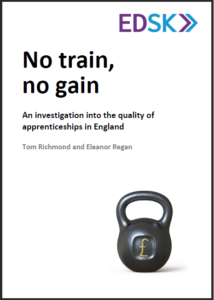
NOVEMBER 2022
In 2012, the Government published a major review of the apprenticeship system in England. 10 years on, almost half of apprentices are now dropping out before completing their training. This report investigates what has happened to the quality of apprenticeships over the past decade to understand why so many apprentices are quitting their training programmes. The report concludes by setting out a package of reforms that aim to halt this worrying trend.
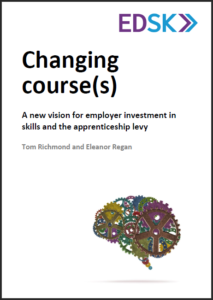
SEPTEMBER 2022
The UK’s persistent underinvestment in skills and training cannot be solved quickly, yet there is a risk that the government’s current approach will end up simply repeating past mistakes. This report from EDSK proposes a package of reforms that set out how the apprenticeship levy and wider skills funding system should evolve in the coming years to create a new culture around skills and training. These reforms will be crucial to boosting the productivity and growth of UK plc both now and in future.
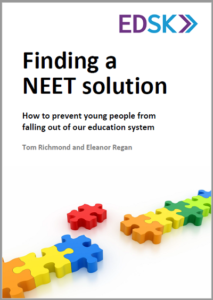
MAY 2022
Despite endless initiatives and interventions from successive governments, the proportion of young people who end up ‘Not in Education, Employment or Training’ (NEET) after leaving school or college has barely changed over the last two decades. This report from EDSK sets out a new approach to reducing the number of young people who do not make a successful transition from education to employment, with an emphasis on ‘prevention’ rather than ‘cure’.
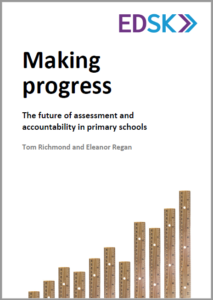
NOVEMBER 2021
SATs were introduced in primary schools 30 years ago, yet debates over the importance and usefulness of primary school tests remain as strongly contested as ever. This report investigates the current set of national tests in primary schools to understand if the assessment and accountability system is helping or hindering attempts to improve standards in primary education across England.
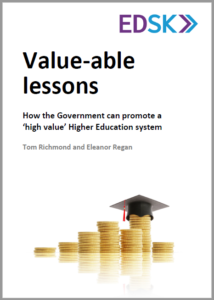
JULY 2021
The debate over ‘low value’ Higher Education has reached a stalemate as politicians, policymakers, university leaders and students seem unable to agree on which degrees and institutions should be labelled as ‘low value’. This report explores the merits (or otherwise) of their respective positions to understand whether there is indeed a problem with ‘low value’ HE and, if so, what should be done about it.
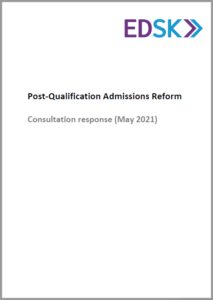
MAY 2021
As the Government moves forward with reforming university admissions, their objective should be to create a Post-Qualification Offers (PQO) system based on students choosing universities, not universities choosing students. The full range of proposals in this consultation response from EDSK would allow ministers to scrap predicted grades, end the scourge of ‘unconditional offers’ and promote fairness and transparency for all applicants – particularly those from the most disadvantaged backgrounds.
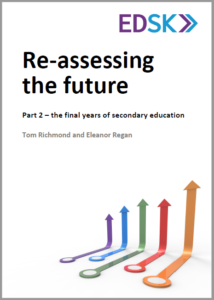
APRIL 2021
A-levels were originally introduced in 1951 to prevent students from specialising too early and only studying a narrow range of subjects. 70 years on, they have failed to fulfil this mission. Even so, the dominance of A-levels has undermined the prestige of applied and technical courses. This report calls for the introduction of a ‘Baccalaureate’ covering academic, applied and technical education to broaden the curriculum and create a level playing field between different pathways for young people.
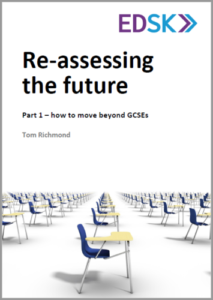
JANUARY 2021
GCSEs have been an important part of our education landscape for over three decades, but the unprecedented events of the last year have created a rare opportunity to consider how we can do things better in future. This report concludes that GCSE exams have outlived their useful purpose and should be replaced by low-stakes online assessments at age 15 that act as a ‘staging post’ for pupils as they progress towards the end of secondary education at age 18.
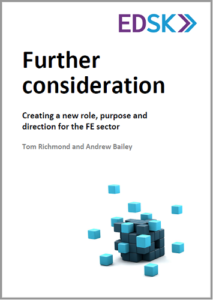
SEPTEMBER 2020
After spending years, perhaps decades, in the policy shadows, the Further Education (FE) sector in England is finally attracting the attention of policymakers including the ‘Augar Review’ of post-18 education and numerous government ministers. Their commitments are welcome and important – the question now is how they will be delivered in practice. This report outlines a package of reforms that aims to ensure the FE sector is respected, ambitious, responsive and stable.
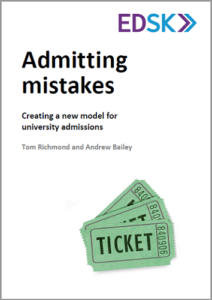
JUNE 2020
This report analyses the three issues that have attracted the most attention in terms of their impact on the fairness, transparency and equity of the university admissions system: the use of predicted grades; the growth of ‘unconditional offers’ from universities; and the barriers facing disadvantaged applicants. It concludes that fundamental changes are needed to make sure that the admissions system works in the interests of students, not universities.
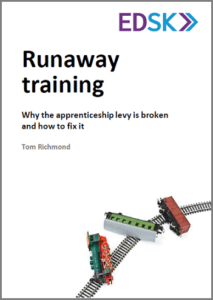
JANUARY 2020
In its first full year of operation, the apprenticeship levy raised £2.7 billion and this is expected to rise to £3.4 billion by 2023-24. However, there have been repeated warnings in recent months that the funding pot generated by the levy is about to run out. This report investigates what is happening with the apprenticeship levy and with the apprenticeship system in England more broadly.
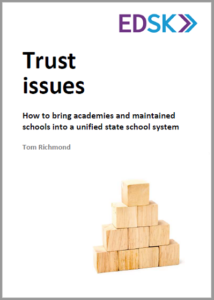
SEPTEMBER 2019
England now has two sets of state schools that are run separately from one another – local authority (‘maintained’) schools and academies. Inevitably, this has produced a fragmented and incoherent education system, with little sign of improvement on either front. This report analyses the problems being caused by the divide between academies and maintained schools, and calls on the government to set the goal of creating a single state education system made up of different types of schools and school groupings.
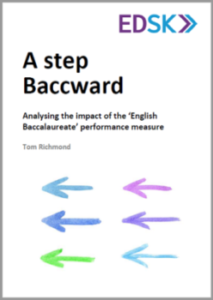
JULY 2019
This report investigates the changes to GCSE entries and outcomes for secondary schools since the ‘English Baccalaureate’ (EBacc) measure was introduced in 2010. The analysis shows that, while subjects included within the EBacc have typically seen their GCSE entries rise, many subjects outside of the EBacc such as Music and Art have experienced significant declines in GCSE entries and are increasingly being taught after school or as optional activities. The report puts forward a set of recommendations for how to address this disparity between subjects.
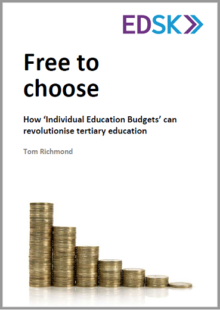
MAY 2019
This report sets out a new system for funding post-18 education that can deliver better outcomes and significant savings for both students and taxpayers. It recommends that all 18-year-olds are given an ‘individual education budget’ into which the government places up to £20,000, and this money can be spent on either a university degree, college course or apprenticeship. The report also proposes that each learner is given a ‘lifetime loan limit’ of £75,000, which they can use at any time to invest in education and training throughout their career.
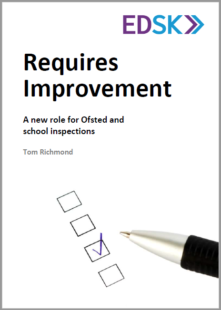
APRIL 2019
Ofsted occupies an important position in our education landscape, but inspecting over 20,000 state schools is still a considerable undertaking. This inaugural report from EDSK therefore seeks to answer four questions: first, can parents trust the grades given to schools by Ofsted; second, is Ofsted measuring the right things; third, what impact does Ofsted have on teachers and school leaders; and fourth, do Ofsted inspections lead to better schools?
WHAT PEOPLE HAVE SAID ABOUT EDSK RESEARCH

Always radical and provocative with original thinking

Eye popping reading

A meticulous and far-reaching critique

This is what think tanks should do,
produce stuff that provokes and makes you think

No one else is doing blue sky thinking in education apart from EDSK
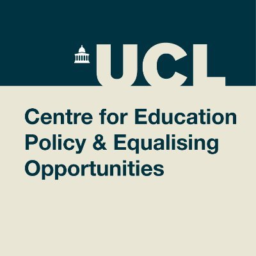
Some radical proposals for reform

Everyone should be interested in what you’ve found

Fascinating report …Honest and revealing

Exciting report from EDSK
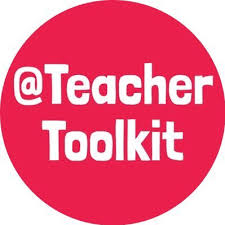
Think tank common sense

A must-read






